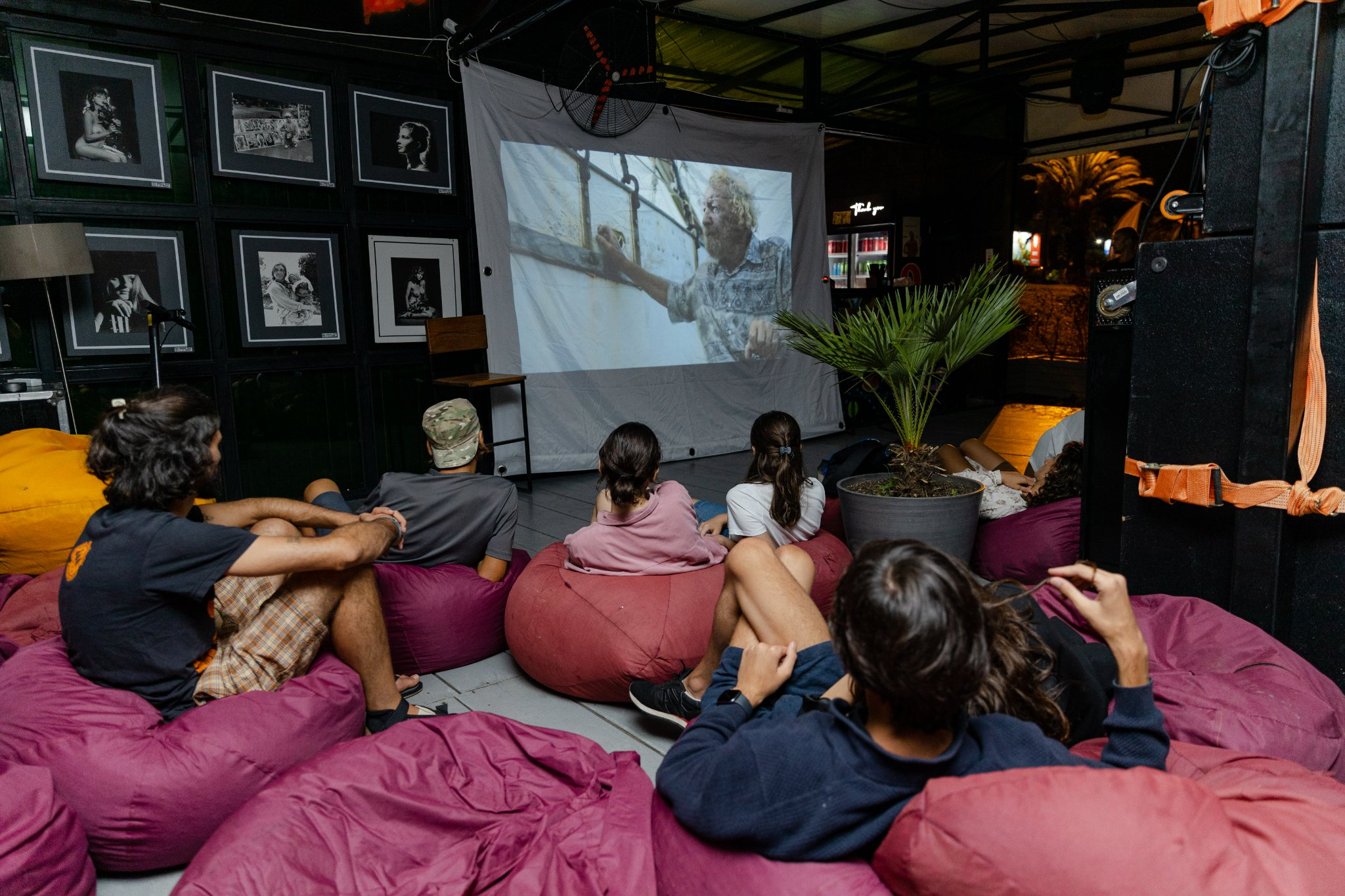Navigating Technical Hurdles
TECHNICAL CHALLENGES
CASE-STUDY ON GEORGIA
AUTHOR: Mariam Jachvadze, Production Manager (Chai Khana Media, Georgia)

Revival of Cinema
With online VOD platforms and home cinema systems now so readily available, creating something the audience can’t experience at home is more important than ever. Cinema enthusiasts are often advised to go a step further and craft an event that the audience won’t easily forget. However, the reality might be totally different for a country like Georgia, which lacks standard independent cinemas but has many old cultural centers in villages and towns that used to serve as cinemas in the Soviet past. The young Georgian enthusiasts who aim to bring new life and concepts to the former Soviet cultural institutions in their hometowns face numerous technical challenges along their journey.
There are young cinema enthusiasts in the regions of Georgia who are trying to revive abandoned buildings, organize film screenings and believe in the magic of cinema. However, this ambitious goal has its obstacles. It seems to be an ongoing struggle and lots of hard work. While in more developed countries, organizers can take for granted the availability of fully-equipped cinemas and community spaces that have their own basic technical facilities (a projector, a sound system and a projection screen) and skilled technicians, in Georgia, there are places where heating, electricity and Internet are still not the norm. In the following chapter, we will describe several cases from Georgia demonstrating how challenging it is to set up technical equipment for community screenings in different locations. But first, let’s answer the following questions together.

To show the film to its best advantage, quality projection and sound equipment are a must, but they’re not everything. It turns out some other rather unusual issues need to be addressed before the screenings. Let’s see:
1. Do you have the basic technical equipment available, i.e. a projector, a sound system and a projection screen?
2. Can the venue be darkened sufficiently?
3. Is the screen high enough to be seen clearly from all seats?
4. Is the sound system equipment suitable for outdoor spaces?
5. If you are screening outdoors, have you checked the weather and secured the screen? It should not be windy or raining.
6. Is the seating comfortable even for seniors? In addition to pouffes and cushions, it is better to have chairs available.
7. Can you run through the screening in advance?

8. Do the speakers and the projector sync with a specific laptop?
9. Do you have enough plugs/cables?
10. If you are using a wall instead of a projection screen, check it thoroughly. Is it damaged? Are there any stains?
11. Have you downloaded the film file on your laptop?
12. Have you checked the sound?
13. Have you seen the film in advance and considered the context of your region and community?
14. Who from your team is responsible for the technical side of the screening? And is this person there for the whole screening?
This list could serve as a helpful guide that has the potential to make a significant difference.
New Life for Bolnisi Movie Theater
There are a few small cities in Georgia where film screenings have gradually become a part of everyday life, at least for the younger generation. Bolnisi, located in the central part of the Kvemo Kartli region in southeastern Georgia, was one of the first cities where the locals began to advocate for a cinema and successfully persuaded the city hall to renovate the old movie theater. It still has a long way to go, but a team of three young cinema enthusiasts has been screening films in this old building since 2020. They invite Georgian filmmakers to their city, watch movies together, and organize Q&A sessions after the screenings. However, they find it hard to recall a day when the screening went smoothly without any technical hiccups.


“The first step was to bring power to the building. Initially, we thought the low volume was due to our poor-quality audio system. But the truth is that since it is a big hall with a high ceiling, it presents a challenge to acoustics, so the sound does not travel properly. The sound system must be adjusted for the hall and cinema screening. As for the projector, it is better to always put it in one place, so you don’t have to adjust the zoom and focus every time. We bought an iron structure for the screen and made it from a material used for advertising banners. It does not transmit light; the background is black, so the rays of the projector do not pass through. We have quite a big screen. We started stretching from the corners so that it would stretch properly without leaving any lines.”
Vano, Bolnisi (Georgia)
Community of Cinema Enthusiasts in Gori
The Art House, established by members of the Gori Photographers Club, stands as another vibrant and creative space in eastern Georgia. They organize film screenings to prompt the audience to contemplate ongoing issues through documentary films. Nevertheless, building a community of cinema enthusiasts comes with its share of technical challenges. The large round hall designed as an exhibition space proved acoustically challenging during film screenings due to sound distortion and echoes. However, the team found a solution by covering the floors with carpets and filling the empty walls. The sound quality has significantly improved.

“Experience means a lot, especially when you are poorly equipped. I remember a problem with an AUX cable once, hindering the transfer of sound from the laptop to the speaker. We had to replace it. Since then, we have kept a big box stocked with various types of cables at the venue. The connectors between the speaker and the laptop from which the movie is played are crucial. Sometimes the devices do not sync with a specific laptop, so testing beforehand is essential.”
Ana

Screenings in the Highlands of Racha
Experience holds significant value for Eter Arsanidze, who lives in Racha, a highland area in western Georgia. She is a young activist who has established a community organization in Racha. Eter has brought together young people from different villages, procured a projector, screen and up to 15 chairs, and travels from one village to another, bringing cinema to the locals. Given the absence of high-quality projection, sound equipment, and space flexibility, each screening comes with technical challenges.
Due to their limited experience organizing film screenings, Eter and her fellows realized a bit late that they should have darkened the room beforehand. She recalls a day when they were set to screen a documentary film by Salome Jashi, who, recognizing the problem, brought darkblack curtains to cover all the windows and prevent light from coming in.
“The speaker we purchased works well indoors, but its power is insufficient for open spaces. During a cartoon screening for children, the sound was so poor that the kids could hardly hear anything. As a result, they gathered as close as possible to the screen, practically sitting on the stage.”
Eter
Preparations for Screenings in Tetritskaro
Lighting is one of the major challenges many screening venues face. Pati Shavadze, who works for the Youth Centre in Tetritskaro (a town in southern Georgia), recalls they have never held a single screening during the daytime, always waiting until dark. In addition, the stability of the Internet sometimes seriously hampers the screenings.
Up to six community organizations created the network KSELI, which unites young cinema enthusiasts to exchange experiences and support each other in enhancing access to culture in the regions of Georgia.
EXCHANGE KNOW-HOW
SUPPORT EACH OTHER
“We never trust the Internet. We always download the film file in advance, preferably a day before the screening. Sometimes, the download can take too long, up to 3–4 hours. It’s also crucial to check whether the download has been successful. There was a case where we thought we had downloaded the file, but it jammed at the last minute. So, it is definitely worth checking beforehand. I would also advise you not to rely on an external hard drive; always download the file onto the laptop or computer.”
Pati
Notes and Sources
PHOTOS:
ADAMIA, Levan; ARSANIDZE, Eter; CHKHARTISHVILI, Natali; KOŘÍNKOVÁ, Eva; PHALAVANDISHVILI, Lasha and Tato TSIKARIDZE
We live the documentary film, be there with us.
Start each month with a fresh dose of information. Subscribe to the newsletter.
I hereby consent to the processing of the personal data.










